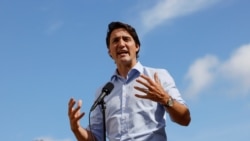As experts digest the implications of the unexpected AUKUS agreement, initial fears that the deal could undermine one of the world’s premier intelligence-sharing arrangements appear to be easing.
In the days after the September 15 announcement of the strategic partnership embracing the United States, Britain and Australia, international attention focused on the angry reaction from China – which saw itself as the target of the new grouping – and France, which not only lost a lucrative submarine deal with Australia but also had its own Indo-Pacific plans shoved aside.
But the announcement also prompted some dismay in two other countries – Canada and New Zealand – which together with the three AUKUS partners make up the “Five Eyes” intelligence-sharing group of Anglophone countries.
New Zealand, led by the highly popular left-leaning Prime Minister Jacinda Ardern, immediately came out with a testy-sounding announcement that the nuclear-powered Australian submarines to be built under the deal would not be allowed to dock in its waters.
And in Canada, an embarrassed Prime Minister Justin Trudeau found himself forced to explain to critics just days before his country’s September 20 federal election why Canada was left out of the deal.
Canadian military analysts say the country was not included principally because it had nothing to contribute to a nuclear submarine program. Canada's National Post reported Trudeau's comments, without exact quotes, as being that the agreement would have no impact on the Five Eyes partnership.
In the end, Trudeau survived the election, though he failed to improve his Liberal Party’s standing in Parliament. And while the Canadian military-issues magazine Esprit De Corps was still writing this week about “a snub to Canada," other analysts have moved on. A report issued Thursday by the Macdonald-Laurier Institute focused on other ways that Canada can contribute to the Five Eyes.
In New Zealand, meanwhile, an initial flurry of concern about the AUKUS agreement quickly faded amid public recognition that the nation’s popular rejection of the military use of nuclear power disqualified it from participation in the deal.
“AUKUS made the news here momentarily,” said Nicholas Dynon, chief editor of New Zealand’s Defsec Media, “but the 24-hour news cycle has moved on.”
Dynon told VOA that in addition to its aversion to nuclear submarines, New Zealand was left out of AUKUS for many of the same reasons as Canada – namely there was not much it could contribute to an alliance that seems focused on checking China’s diplomatic and territorial expansion.
“Some commentators have suggested that New Zealand’s AUKUS ‘snubbing’ is due to Wellington being too cozy with Beijing,” Dynon added. But, he said, “This is a little fanciful.”
New Zealand’s contributions to the Five Eyes are limited. Its intelligence agency, NZSIS, employs only about 300 people, while equivalent agencies in the U.K., Canada and Australia employ thousands. New Zealand’s navy consists of only two frigates, four patrol vessels, one replenishment oiler, one strategic sealift ship and one hydrographic survey ship to guard the island nation’s entire coastline.
“Their natural remit is some of the islands in the South Pacific," said former Canadian intelligence analyst Phil Gurski.
“They’re very professional, they’re very competent,” Gurski told VOA. “But the fact that they’re so tiny, they don’t have the impact the other four Eyes do. … If they stopped doing intelligence gathering tomorrow, the other four Eyes could pick up the slack.”
Zack Cooper, an analyst with the Washington-based American Enterprise Institute, told VOA that New Zealand’s own policies would have made it very difficult for the country to participate in AUKUS.
“New Zealand has very public objections to military uses of nuclear technology, which would prevent New Zealand from procuring any nuclear capabilities itself,” he said.
“It might still have been possible for the United States, Australia and the United Kingdom to include New Zealand in some broader defense technology cooperation,” Cooper said, “but I think that would have been difficult to pull off when the nuclear-powered submarine was so critical to the existing deal.”
New Zealand-based foreign policy expert Stephen Hoadley told VOA the country may be happier out of the deal for economic reasons as well.
“While New Zealand may posture rhetorically about human rights and rules-based order, its economic imperatives drive much of its foreign policy,” he said. “This means getting along with China for trade advantages and negotiating with the UK and EU for free-trade agreements.”





